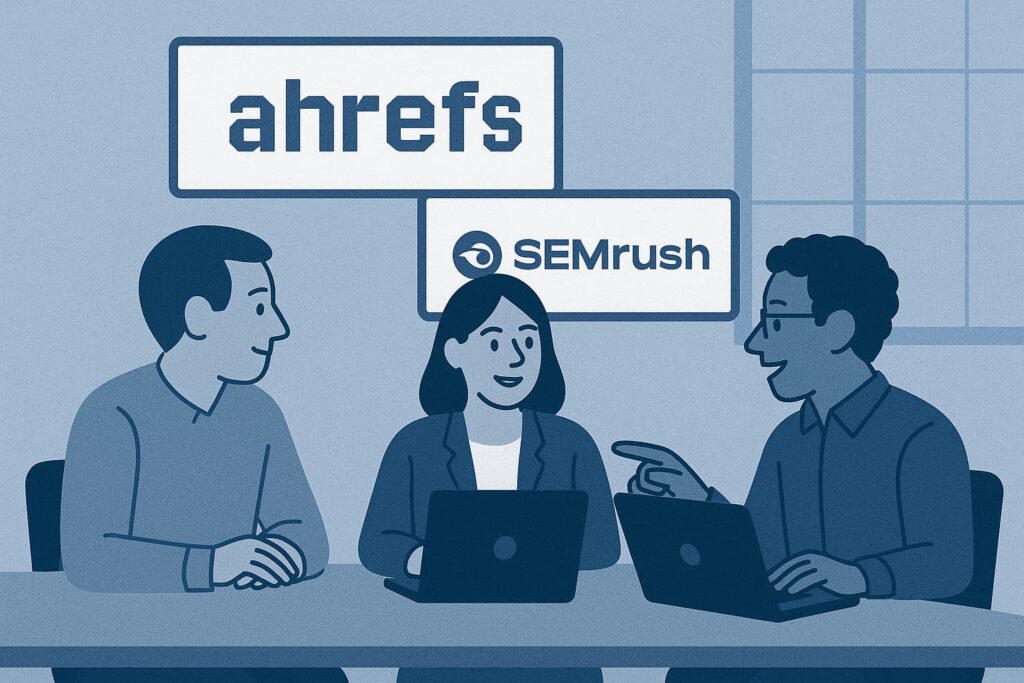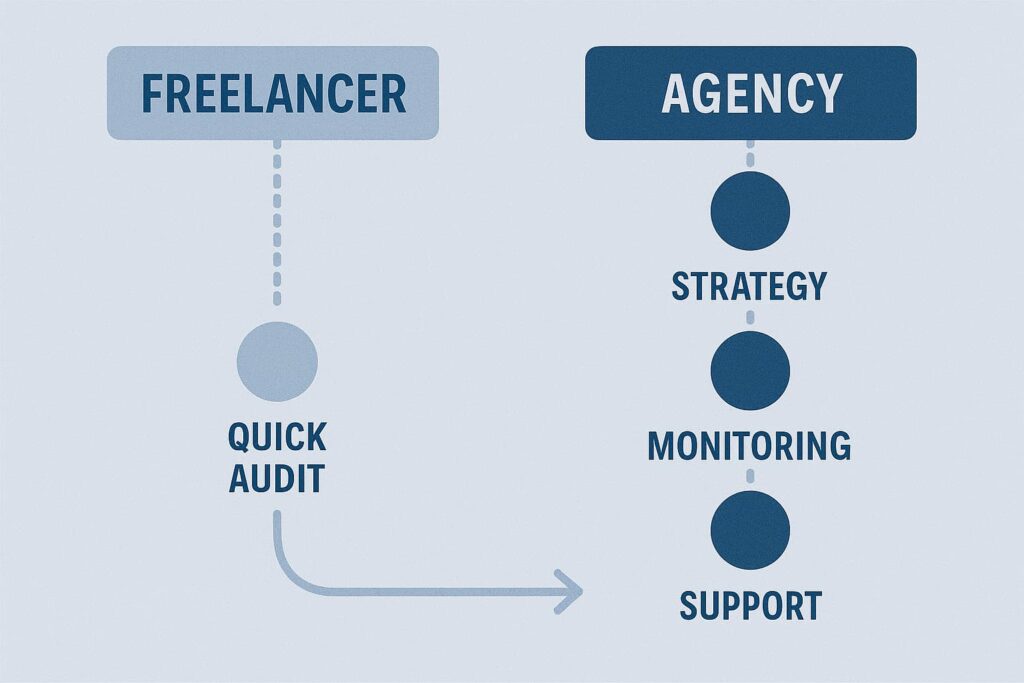Companies looking for link audits usually have two main options: work with a solo freelancer or team up with an SEO agency. Both choices come with their own pros and cons – which one works best depends on how much you can spend, the size of your project, and how deep your SEO needs go.
What Is a Link Audit?
A link audit is a review of a website’s backlink profile. It detects toxic, spammy, or low-quality links that may impact search rankings. The process includes:
- Checking for unnatural or manipulative links;
- Identifying broken or redirected links;
- Analyzing anchor text distribution;
- Reviewing link sources for authority and relevance.
A comprehensive audit that cleans up a website’s backlink profile improves SEO performance and reduces penalties from search engines like Google.
How Freelancing Works for Link Audits
Freelancers take on jobs directly from clients while working alone. The majority of companies locate them on websites like LinkedIn, Fiverr, and Upwork. Once connected, they’ll hash out the details—what the audit should cover, the deadline, and the price.
Many freelancers continue to use free or less expensive services like Ubersuggest or Google Search Console since they are responsible for paying for their own tools. After the audit is complete, a report—sometimes including recommendations—will be sent over. But that’s typically where it ends, unless you’ve committed to further labor up front.
Freelancers can be great for simple audits—just keep in mind that what you get depends entirely on that person’s skills and what tools they’ve got.
How Agencies Work for Link Audits

Agencies conduct link audits in an organized manner, beginning with a thorough review of a site’s backlink profile. Unlike freelancers, they use paid tools such as Ahrefs, SEMrush, and Majestic for in-depth analysis. Multiple professionals analyze the data for correctness before presenting thorough reports with actionable recommendations.
For businesses requiring the most reliable audit services, established providers like 3XE Digital stand out by offering comprehensive follow-up support. Their service includes not just identifying problematic links, but also preparing disavow files and conducting periodic rechecks to maintain link health. This level of thoroughness makes professional agencies the preferred choice for complex websites, penalty recovery situations, or any scenario where incomplete audits could prove costly.
The main advantages come from their team-based approach and access to better resources, though this typically comes at a higher cost than freelance alternatives. For websites where search performance is critical, the investment often proves worthwhile.
Freelancers: Pros and Cons
There are advantages and disadvantages to using a freelancer for link audits. Depending on the needs and objectives of their projects, businesses should carefully consider these issues.
Pros:
- Cheaper – Lower rates since they don’t have big overhead costs.
- Faster communication – Work directly with one person, no middlemen.
- More flexible – Can customize their approach to your needs.
Cons:
- Fewer resources – May lack advanced tools or a team for big audits.
- Hit-or-miss quality – Some are great, others inexperienced.
- Unreliable availability – If they’re busy or sick, your project stalls.
- No long-term help – Most only do one-off projects, not ongoing support.
Agencies: Pros and Cons
There are distinct factors to take into account when working with an agency for link audits as opposed to employing a freelancer. Your company needs should be the basis for evaluating the trade-offs between cost and resources.
Pros:
- Premium tools for better data
- Diverse team expertise
- Consistent, thorough audits
- Contract-backed accountability
- Ongoing support included
Cons:
- Higher cost (overhead)
- Slower turnaround
- Less personal attention
Key Differences Between Freelancers and Agencies
Choosing between an agency and a freelancer for your link audit affects your SEO results. Each has pros and downsides; here’s how to pick the ideal one for you.
1. Cost & Tools
Freelancers: Budget-Friendly but Limited
Freelancers usually charge less since they don’t have costs like office space, premium tools, or employees. As a result, they often use free or limited SEO tools (e.g., Google Search Console, Ubersuggest, or free versions of Ahrefs/SEMrush). While they can still provide useful insights, their analysis may lack depth and competitive edge compared to agencies.
Agencies: Higher Investment, Better Tools
Agencies use paid SEO tools (like Ahrefs, SEMrush, Majestic, Moz Pro, etc.), which give them more precise, current, and detailed data. This allows for:
- More thorough backlink analysis (finding toxic links, comparing competitors, accessing past data).
- Improved spam score assessment (spotting harmful links more accurately).
- Enhanced reporting (customizable dashboards, tracking trends, focusing on key problems).
For a fast, budget-friendly check, a freelancer could work. But for detailed, data-backed analysis, an agency’s tools offer a significant edge.
2. Expertise & Specialization

Freelancers: A One-Person Show
You are depending on one person’s skill set while working with a freelancer. While some freelancers possess exceptional skills, others could be inexperienced with intricate technical SEO problems or sophisticated backlink tactics. They may overlook subtle issues in your link profile if they are a generalist.
Agencies: A Team of Specialists
A comprehensive link-building audit includes backlink scans, link quality checks, lost link recovery, competitive analysis, toxic link removal, and tailored recommendations to improve SEO performance. For example, 3XE Digital provides detailed audits that identify both risks and opportunities to strengthen your backlink profile.
Agencies usually have dedicated experts for different aspects of SEO:
- Technical SEO specialists (crawl errors, site structure);
- Backlink analysts (toxic link removal, competitor gap analysis);
- Content strategists (anchor text optimization, linkable asset creation).
This implies that your audit will go beyond a simple list of broken links and will encompass technical, off-page, and strategic recommendations. If your site has complex link issues, an agency’s multi-disciplinary approach ensures nothing gets overlooked.
3. Project Size & Reliability
Freelancers: Great for Small Projects, Risky for Large Ones
Freelancers work well for small websites (under 500 backlinks). They are also suitable for quick audits (identifying obvious toxic links) and one-time fixes (disavowing spammy domains).
They may, however, find it difficult to handle extensive audits (10,000+ backlinks). If they vanish or become busy, ongoing monitoring might become irregular. Furthermore, complicated recovery scenarios (such as removing penalties or sabotaging competitors) sometimes call for greater resources than a freelancer can offer.
Agencies: Built for Scale & Consistency
In order to maintain focus, agencies use specialized project managers. They have backup resources and employ organized procedures to manage large datasets (no single point of failure).
While a freelancer can feel overloaded, an agency can effectively filter and rank hundreds of backlinks to your website.
4. Ongoing Support & Long-Term SEO
Freelancers: One-and-Done (Usually)
Most freelancers deliver the audit and move on unless you hire them for additional work. This means:
- You may need to manually update disavow files.
- No proactive monitoring of new toxic links.
- Limited follow-up strategy (e.g., link building to replace bad links).
Agencies: End-to-End SEO Management
Many agencies offer ongoing services, such as:
- Regular backlink monitoring (alerting you to new spam links).
- Disavow file updates (as new toxic links appear).
- Recovery strategies (if your site gets hit by a Google penalty).
This makes agencies a superior option for long-term SEO health, particularly if you’re in a highly competitive or spam-prone niche.
Choosing Between a Freelancer and an Agency for Your Link Audit
To make the right choice, consider these key factors based on your needs:
Budget
Freelancers are usually cheaper, which is great if you’re tight on funds. Agencies cost more but offer deeper expertise. Decide if saving money is worth the risk of a less detailed audit.
Project Size
For small sites (under 500 links), a freelancer may be enough. But for big sites, e-commerce, or complex link networks, an agency’s team and systems work better.
Risk Level
Agencies are better equipped to handle major problems, such as poisonous connections or a Google penalty. A freelancer could work well for regular inspections on healthy sites.
Ongoing Requirements
Consider whether you need a one-time checkup or continuous monitoring. Freelancers typically deliver single reports, while agencies often provide:
- Quarterly re-audits;
- Regular disavow list updates;
- Ongoing link monitoring;
- Progress tracking against benchmarks.
Specialized Knowledge Needs

Some industries need specialized SEO skills. Local businesses benefit from community backlinks, e-commerce sites require optimized product pages, and global brands use ccTLDs and hreflang tags for international SEO. Agencies excel with dedicated experts for these challenges.
Decision Factors Summary
Freelancers make sense when:
- Your budget is tight.
- Your site is small (<500 backlinks).
- You need a basic checkup.
- No immediate penalties exist.
Agencies are preferable when:
- SEO is mission-critical.
- You’re dealing with penalties.
- Your site has complex link structures.
- Ongoing maintenance is required.
- Specialized knowledge is needed.
To make the optimal option, you must evaluate these factors objectively in respect to your company’s objectives and available resources. Despite the higher initial cost, the agency technique often produces better long-term results for high-value websites where search visibility generates revenue.
Final Verdict: Who Should You Hire?
For a small, simple website on a tight budget, a skilled freelancer could work. But for larger, complex sites—or if you need ongoing support—an agency is often the smarter choice. They offer a full team, better tools, and proven strategies for more reliable results, even at a higher cost. Consider your site’s size, SEO needs, and available resources when deciding.


